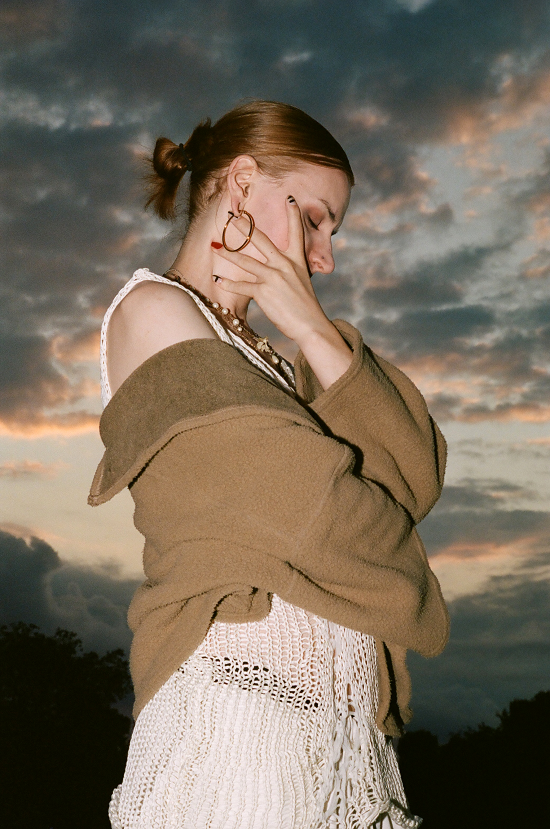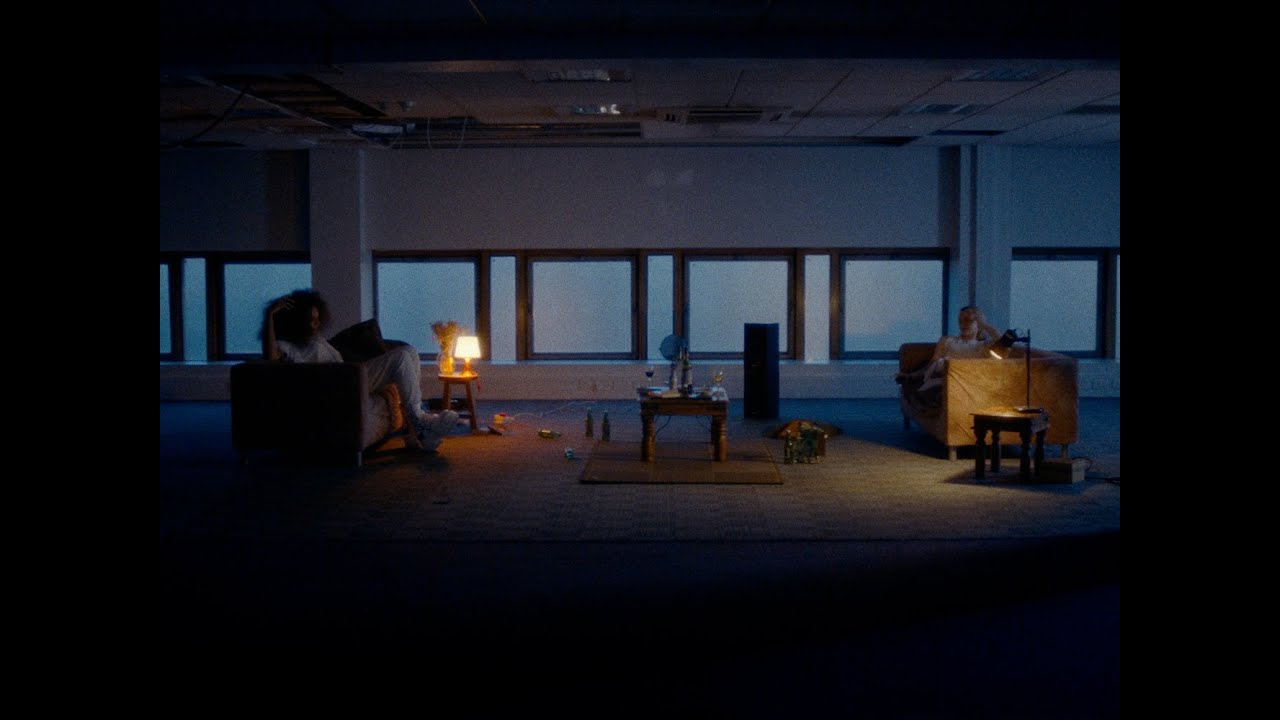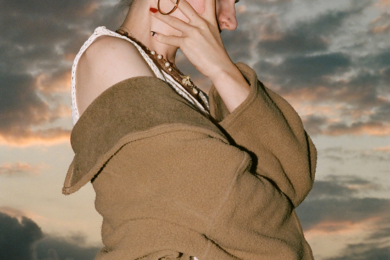Photo by Suleika Müller
"Spinning yarns, fabricating fictions, fashioning fashions… the textures of woven cloth functioned as means of communication and information storage long before anything was written down."
So wrote Sadie Plant in Zeros + Ones: Digital Women + The New Technoculture. A radical and prophetic text when released in the late ’90s, her book picked at the threads connecting womanhood, computing, industry exploitation and community throughout modern history. Whether it’s weaving, telecoms or computers, this invisible sisterhood has guided technology. A true polymath, Plant blended poetry and philosophy to show how women have embedded their stories within the fabric of technology, even when they are "the object of information, never the subject in communication."
Aya Sinclair grew up in Huddersfield, surrounded by the kinds of telecom masts and textile mills that Plant writes about. She talks about Zeros + Ones the way you might about one of her own club tracks: "It slaps so fucking hard." Approaching the release of im hole, her debut album on Hyperdub, Sinclair is as influenced by the subtle and provocative work of Plant as she is the heady and innovative dance tracks she’s become known for.
"There’s a lot of stitching and weaving on this record," she says. There’s a lot of tying knots and coming undone at the seams. [Plant] is talking about the idea of pulling a needle through a slip, and back through itself again. You can feel her doing that with her writing. As I’m reading it, it’s melting my brain."
im hole has the same ability to pull the listener forwards and backwards in time, through tangled moments within her life that are in conversation with each other. The record was made during an intense period of change and self-discovery. Having only publicly come out as trans a few years ago, the album reckons with making parts of herself public for the first time. That coincided with a move to London, away from her musical home of Manchester where she has forged many strong connections within a scene that didn’t exist in quite the same way before she arrived.
As a result, the record contains a restless mix of aya’s many sides. Abstract poetry coalesces with grime, drill, jungle and leftfield club experiments. The central pull is aya herself. The artist is aware of the potential trappings of persona-led music. For one, the pressure that comes with placing yourself at the centre.
"I’ve made this album where I’m talking about some personal shit, but this is what made sense for me to write," she says. "How I square that with myself – putting it into the public, and how people might view me on the other side of it – is by showing a certain side of vulnerability that I maybe wasn’t showing before or was hiding behind humour. The approach I have with most things is, ‘Well, you’ve fucking done it now so you better figure it out’.
"I think my realisation is that it doesn’t matter how much you share. People are going to take things in whatever way anyway. The way in which you intend material to be consumed is never the way that it is."
"Swallow me whole," aya repeats on ‘Emley Lights Us Moor’, the record’s lead track, featuring her long-time collaborator and friend Iceboy Violet. "It’s kind of cringe, but the genesis of that track was, ‘What if there was an ASMR Drill tune?’" Sinclair says. "It’s taking this thing that is so forceful and constructing it out of all these tiny little sounds. This is something that me and Iceboy Violet have talked about a lot. Hardness and softness, and how vulnerability can be aggressive."
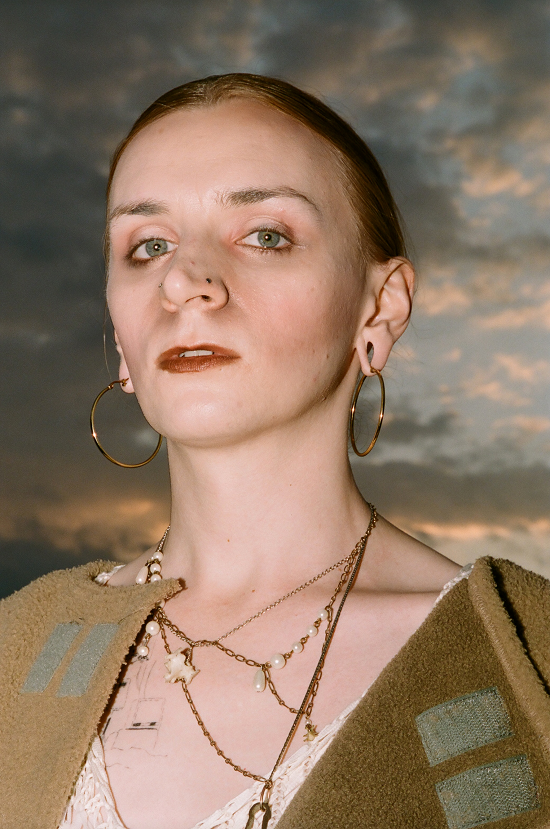
Photo by Suleika Müller
It’s not the first time that the Emley Moor mast has appeared on a record by aya, having adorned the cover of 2019’s and departt from mono games EP. "Emley Moor mast is beautiful," she says. "For a long time, I thought I could see it from everywhere I’ve lived in the North, but then I looked at a map and realised that it’s physically not possible.
"When we were teenagers and we’d take loads of drugs and walk around the moors, it was a good way to navigate. There’s a TV tower that I could see from the window of my old flat, which is where me and Iceboy spent so much time mythologising all the stuff that became this record.
"My parents still live up on the moors. It’s one of my favourite places in the whole world. I’m looking forward to living there in, say, seven years’ time. We’ll see. If you’ve grown up in the countryside and you’ve had to walk the dog on the moors when it’s driving rain every day, I think it’s baked in that you’re gonna go back to that. I’m going to have my flat cap and whippet, yet."
Sinclair is a lifelong performer. After starting as a drummer at a young age, she joined community music groups with her dad. This led to kraut and post-punk bands in her teens, a fascination with production and synthesis, and eventually, a move to Wales where she took a formative music course in Newport, now gone due to a lack of funding.
"They gave me the tools I needed to function as a practitioner," Sinclair says. "There’s a lot of technical stuff about composition, but then there’s also thinking about your music artistically, which is a non-obvious statement for a lot of musicians. Many musicians don’t see themselves as artists."
aya’s position as practitioner is clear in the way she conducts herself, filling the role of DJ, scholar, joker and host across her various projects, whether it’s on record, or on her freeform NTS radio show. This insight extends more widely to way she views artistic framing.
"I’ve had this real shift from thinking about the individualisation logic of cultural production and the ‘myth of the single genius’. It’s easy to believe that when you see a solo artist, they’re doing everything, because the other people involved tend to be hidden. I’ve realised that I am surrounded by incredible artists all the time, that maybe not doing everything myself isn’t a crime."
That individualisation logic is something her album knowingly plays with, making ‘aya the persona’ part of the story with a wink. That’s part of what led to her name change from LOFT a couple of years ago. She killed off the moniker in style, with a gargantuan drop of unreleased edits from her decade as a producer, aptly titled are eye pea ell oh eff tea.
"Having an alias is a thing to hide behind. There’s a mental distance between you and your work. It’s strange how you then negotiate that still, between, ‘I’m Aya Sinclair the person’, and then ‘aya the artist’. That’s a separate mindset, but it’s much closer to who I am, and you expect to see my face in it.
"This air of anonymity and mystique feels like a holdover from another generation. The way the industry is set up now, the thing that sells stuff is personality. It’s that individualist thing. It’s influencer economies. Around 2013, everyone was suddenly behaving like popstars. It’s not even just about musicians. It’s consumers.
"Everyone is existing in this place where all the little scraps and throwaway things become part of these cultural products that are sold, whether it’s sold for likes in a contemporary Instagram way or B-sides from an album. Everyone wants to understand everything about these media entities, and the mystique isn’t good enough anymore. Everything is an ‘experience’. Look at Donda. It kind of eclipses the album."
That same insight around framing extends to the album’s physical release, which takes the form of a book of poetry, worked on in collaboration with Oliver Van Der Lugt, AKA Air Max ’97.
"On a very base resource level, I’m engaging with the petrochemical industry directly. I’ve got a lot of records," she says, turning her camera to a wall of them. "But I’m being conscious of my own consumption. I’m in no way sending for anyone who releases stuff on vinyl. I’m also putting my voice and personality front and centre, and the best way to embody that is to give people a lyric sheet.
"The third way that I was looking at it was through how we value music. So often, it’s based on their physical manifestation. If you’re an artist who’s done a bunch of club singles, and then you do an album that comes on a 2xLP gatefold, there’s a legitimising that takes place there. If I decide to do a tape, that puts me in a certain world, and then if I decide to release a CD, then that’s kind of a ‘Y2K’-ish thing. There’s aesthetics that go with that. How do I put this out on my own terms?"
We come back to threads and information storage frequently in our conversation. For Sinclair, there’s a sort of communal weaving that happens within rhythmic choices. "You can take the same drum pattern and put a slightly different swing on the hi-hats, and they mean two very different things. Something as simple as your kick pattern says so much, culturally.
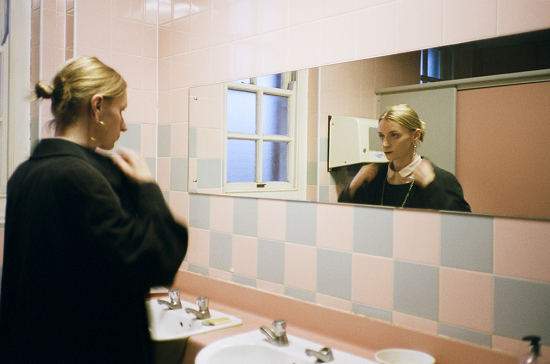
Photo by Dorothy Dee
"This phraseology that we have for music all has a very traceable language. That’s why you find these commonalities between very disparate pieces of music.
"When you sample the ‘Think’ break – the six second ‘Yeah!’ and the ‘Woo!’ – you’re getting four different instrumentalists, the engineer that positioned the microphones, the mixdown engineer, anyone who’s had anything to do with distributing it… and then you’re having the full cultural legacy of that break in the wider context of music, and you’re dropping that into a tune.
"On the one hand, it’s totally flattened, because there’s a moment before it becomes intellectualised where it’s just purely affective. And then there’s all this cultural signifier stuff, all these people’s experiences. Sometimes I think about that and I get a bit dizzy."
There is a ‘Think’ break on im hole, one of just two hidden samples on the record. It’s used in such a playful way that it’s impossible not to smile if you catch it. For all the album’s cerebral considerations, it remains a visceral and tactile dance record. A track like ‘Dis Yacky’ satisfies with vacuum-sealed drum hits and a fluid and woozy drum groove that eventually bubbles over into a shuffling post-dubstep beat.
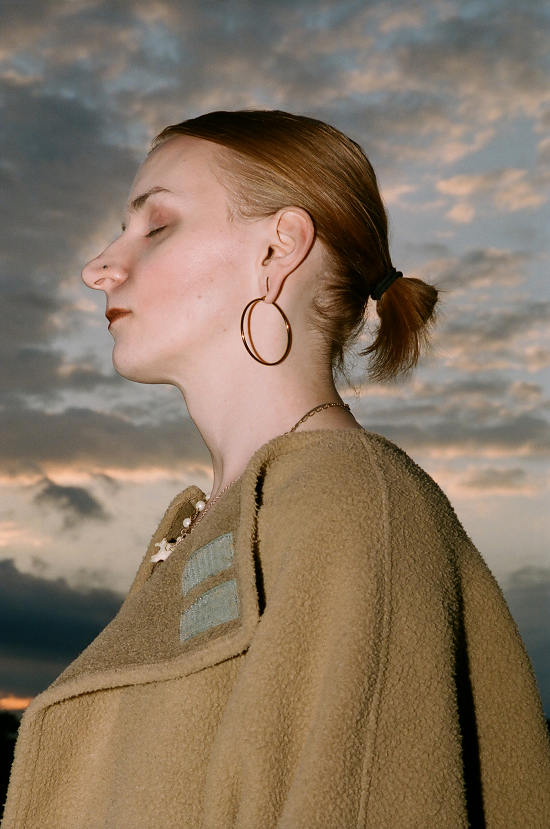
Photo by Suleika Müller
Aya’s approach to club music was honed as part of boygirl, the queer music collective in Manchester that was born out of necessity and compulsion rather than forward planning.
"A couple of my friends were putting together a bunch of themed nights. One of them was called ‘Icy Nights’ and everyone had to come in white and ice blue. They got as far as the second one. It was a Valentine’s thing and they called it ‘boygirl’. Everyone came in pink and blue. This is 2017, so a slightly different cultural landscape.
"We were playing a lot of grime. We thought, ‘What does it mean for us who are a bunch of queers, some who haven’t realised they’re all queer yet? What’s our proximity to this very masculine culture? What’s our proximity to dance music? And what’s our proximity to gay culture, as well?’ I don’t think any of us were really going to The Village or anything in Manchester. We were in this odd space in between all these things, and we had to kind of make our own space.
"We started doing a monthly at a bar that I was working at. It would happen on a Wednesday night, and we’d basically have this private party in the corner of an open space. We’d all come in looks. I’d come in big makeup – and then there’s just people eating chicken burgers. We’re all plastered in the corner by the time it gets to 9pm, because it’s got to finish by 11.30pm, so we’d start earlier. Suddenly we had this eight-to-nine person collective. It happened out of nowhere. And as quickly as it arose, it kind of fell apart. It’s beautiful.
“We went through a very difficult period of our lives all together, all at the same time. I feel so honoured and blessed to have been through that, and to have this special connection with these people. For all the difficulties of being in a collective, it was really special."

Photo by Suleika Müller
Even in the darker moments of im hole, like the introspective body horror of ‘OoB Prosthesis’, there’s a frenetic playfulness that undercuts it. Humour has long been a part of Aya’s arsenal, and now, it brushes right up against pain: "I once tweeted, ‘some of you never had to use humour as a self-defence mechanism and it shows’, and I think that’s kind of it. There is something to be said for an acknowledgment of humour existing next to tragic or traumatic experiences. There’s always something hilarious that happens directly after something really shit happens.
"I’m conscious of irony giving the sincerity a certain power as well. If you’ve been stating things in the negative as it were, by making these ironic or sarcastic statements, when you say something that you really truly believe, it has that impact."
Near the end of our chat, we’re brought back to the ideas of threading and autobiography. As she becomes more public-facing as a musician, Sinclair has been frustrated by the boxing-in of her art solely in terms of gender, identity or transness. "I love jungle as much as I’m trans, you know? There are many different things happening inside here.
"The thing that frustrates me the most is, when does the work speak for itself? It’s including people to meet quotas rather than because you have faith in the work that they do. The questions around them become about identity rather than about the work that’s being made. Instantly, this ultimately well-meaning thing around inclusion initiatives becomes a flattening of people’s work and intentions. It further others people and moves them further outside those conversations."
That boxing-in requires conscious untangling, and Sinclair even finds herself doing it when hesitating to call what she does a form of poetry.
"I think there’s a thing about being an artist where if it’s something that you do, you’ve got to get over it at some point. That’s not a value judgement in calling it that. There’s so much shit poetry in the world. I’m not saying that I’m good."
Hyperdub will release im hole on October 22, 2021. You can pre-order it here

